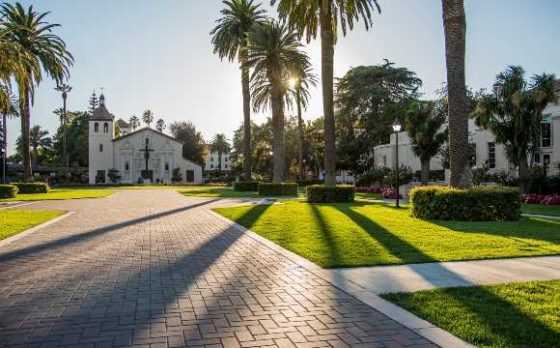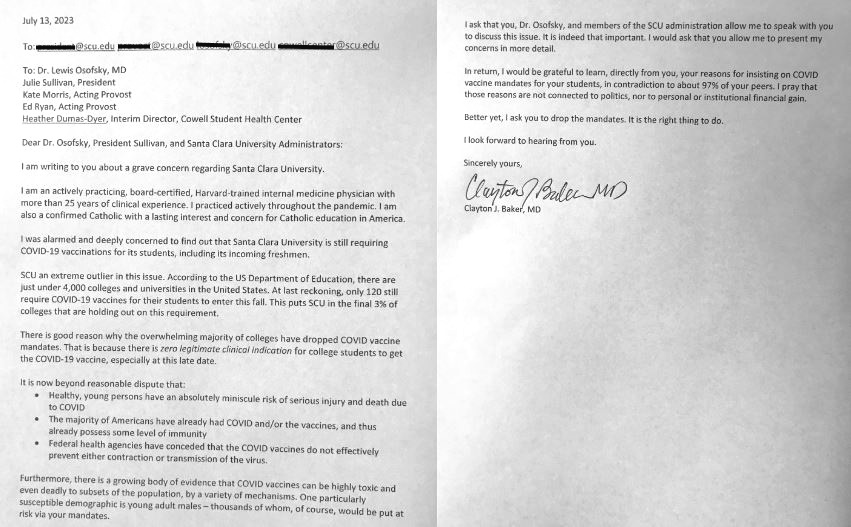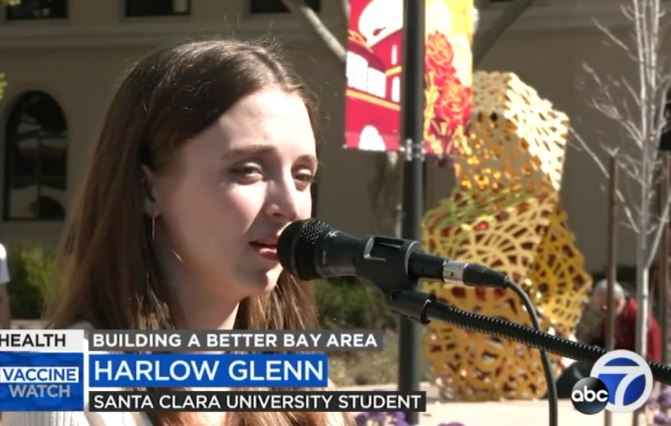
UPDATED
One Harvard-trained doctor calls policy ‘coercive’ and ‘arbitrary’
A group of medical freedom experts and students are challenging aspects of Santa Clara University’s ongoing COVID-19 vaccine mandate, which includes requiring incoming freshmen to receive the shot. They have filed an appeal that alleges the policy is “ruthlessly enforced.”
It was filed in June after a 2022 lawsuit against the policy was dismissed by the courts.
The appeal lists two SCU students and the Free Now Foundation, an organization involved in multiple vaccine lawsuits, as appellants. One of the student plaintiffs was initially denied a medical exemption from the university’s mandatory booster policy even though she had a severe reaction to her first COVID vaccine and her doctors supported her exemption request.
Attorney Rita Barnett-Rose said she and her clients seek to address alleged harms done to students by a hyper-enforced mandate, and that the complaint also argues there is an unethical relationship between SCU’s campus physician and local health authorities.
An oral argument could be set before the year’s end, she told the The College Fix in a recent telephone interview.
Currently about 100 universities — many of which are in California — continue to require COVID vaccination as a condition of enrollment, sometimes with little accommodation for those seeking religious or medical exemptions, said Lucia Sinatra, co-founder of the medical freedom organization No College Mandates.
However, Sinatra said in a recent telephone interview with The College Fix that she believes Santa Clara University, a private Jesuit institution located in Northern California’s Santa Clara County, known for its aggressive enforcement of COVID mitigation policies during the pandemic, is one of the most “abhorrent” and “egregious” of these institutions.
In the spring of 2021, SCU’s then acting president, Lisa Kloppenberg, announced a vaccine mandate for the fall. Shortly before Christmas that year, a trio of SCU administrators, including acting provosts Ed Ryan and Kate Morris, notified students of a booster requirement.

Santa Clara University
These mandates went on to spur lawsuits from both the Free Now Foundation as well as an SCU law student who represented himself. Yet, despite facing litigation, SCU continued with the mandates.
On April 3, SCU updated its COVID vaccine policy to include language regarding incoming freshmen for fall 2023. At present, the policy states, “SCU requires the COVID-19 primary series plus a booster OR one dose of the bivalent/updated vaccine” [bold in the original].
Clayton Baker, a physician and former professor of bioethics at the University of Rochester, found the continuation of this policy so troubling he wrote a letter to current SCU President Julie Sullivan, acting Provosts Morris and Ryan, and campus physician Lewis Osofsky.
Baker highlighted how the COVID vaccines, which he argues are ineffective at preventing transmission, appear to provide little benefit and potentially some risk to healthy, young individuals with high rates of prior infection. He went on to request that campus officials allow him to discuss these claims in further detail or drop the mandate entirely.
Baker, who had yet to hear back from SCU as of late July, told The College Fix in a telephone interview the continuation of such policies is “coercive” and “arbitrary.”
“If the kids are at zero risk, which they are, they’re statistically at zero risk, and [the vaccines] don’t prevent transmission … [the policy is] an arbitrary coercive demand and that is absolutely unethical. That is unethical 101,” he said.

Furthermore, SCU’s continuation of its mandate now places SCU in the minority of institutions of higher education, Sinatra told The Fix, while its strict policies regarding exemptions place it among the most notorious.
They will not allow students to file religious exemptions for the vaccines, she said, despite allowing faculty and staff to do so.
SCU’s “COVID-19 Vaccine Information and FAQs” page appears to confirm this characterization as it provides information for how faculty and staff may request a medical or religious exemption, but, for students, only provides information regarding medical exemptions.
Regarding these medical exemptions, however, Sinatra said, SCU purportedly only grants them under the most extreme circumstances.
According to Barnett-Rose, this is due to campus physician Osofsky’s relationship with the Santa Clara County Public Health Department through the Santa Clara County Medical Association.
“[Osofsky] was hired in August of 2021, right before the mandate happened,” she said. “He was put in charge of enforcing, you know, student exemption requests, denying exemption requests.”
“He is also deeply entwined with the Santa Clara Public Health governing body,” she said.
Osofsky holds several positions within the Santa Clara County Medical Association, which partnered with the county’s public health department to increase vaccination for COVID.
In a March 2022 declaration for the case, Osofsky stated, in his roles with the association, he helps “implement public health policies in Santa Clara County that have been recommended by the state of California.”
According to Barnett-Rose, Osofsky used his position at SCU to advance state and county vaccination goals, thereby violating the rights of SCU students.
The College Fix reached out to Osofsky via email with an interview request but did not receive a reply.
 One of the students whose rights allegedly had been violated by SCU and Osofsky is Harlow Glenn (pictured), a California native and SCU neuroscience major represented by Barnett-Rose.
One of the students whose rights allegedly had been violated by SCU and Osofsky is Harlow Glenn (pictured), a California native and SCU neuroscience major represented by Barnett-Rose.
In a declaration she submitted for the case, Glenn wrote of how she transferred to SCU in 2021 after completing her freshman year at another school. Glenn stated she was not informed of SCU’s vaccine mandate until late that summer. After an initial attempt to get a religious exemption was denied, Glenn wrote, she received the first dose of the Pfizer vaccine while traveling.
In a telephone interview with The College Fix, Glenn described how upon returning home to Los Angeles less than 36 hours later she began to feel ill, stating, “I remember I had like a really bad migraine for like a day or so and I just thought it was the time change and traveling to see my friends.”
However, she said, “The headache got worse. I started getting really bad body aches. And what I ended up going to the hospital for [was] my legs went numb. Like, I couldn’t feel my legs properly. They were numb and like tingly.”
Additionally, Glenn stated, there was blood in her urine. At the time, Glenn said, “I did not attribute it to the vaccine at all … I didn’t even think twice about it being a reaction to that because that just wasn’t really being talked about.”
Her doctors in the emergency room, she said, suspected a kidney infection or severe urinary tract infection. Two days after her ER visit, Glenn stated, she ended up getting what she believes was a severe case of COVID. According to her declaration to the court, this was her second case that year.
About two weeks later, Glenn wrote in her declaration, she saw a doctor at the Toluca Lake UCLA facility in Los Angeles. Her regular primary care physician was out of the office, she stated, but after discussing the symptoms that prompted her ER visit and her recent recovery from COVID, the doctor she saw agreed to write a note supporting her request for a medical exemption.
After submitting that note, Glenn told The Fix, she did not think about the matter too much until November when SCU notified her the request had been rejected. According to her declaration, Osofsky had notified her via email and had stated he convinced her doctor to retract his support for her exemption on the grounds that prior infection and partial vaccination were not sufficient for good immunity.
In his declaration, Osofsky stated Glenn’s note from this doctor failed to use the proper form required by SCU and contained no mention of an adverse reaction to a COVID vaccine. He also acknowledged a brief conversation with Glenn’s doctor and this doctor ultimately agreeing that Glenn did not qualify for an exemption.
Glenn told The Fix she proceeded to see another doctor who filled out the proper form, which she later submitted. According to Glenn’s declaration, this was her regular general practitioner at the Toluca Lake UCLA facility.
SCU rejected this request as well, Glenn said, although Osofsky contests this claim in his declaration, stating he had attempted to contact Glenn’s general practitioner multiple times for additional information but had not received a response and had yet to make a final decision.
In an email to The College Fix, Barnett-Rose wrote that Glenn claims her general practitioner told her over the phone that Osofsky wrote a letter to her stating Glenn’s “adverse events were not serious enough [for a medical exemption] as they did not require full in-patient hospitalization but only an ER visit.”
During this time, Glenn also noted, she began experiencing numerous other health problems, some of which would continue for over a year. These included irregularities with her menstrual cycle and numerous respiratory issues. Her declaration also described nausea, body aches, and fatigue.
“I believe [these issues] were related to the vaccine,” said Glenn in her interview. “My doctors do as well.”
“What my doctor suspects,” she added, “is that my immune system was just compromised.”
According to Glenn, SCU was aware of this as they continued to pressure her to submit to additional COVID shots.
Facing expulsion if she refused, Glenn said, a neighbor whose mother worked with the foundation helped put her in touch with the organization which led to her becoming involved in the lawsuit against SCU.
Barnett-Rose told The Fix once they started the lawsuit, the university “quickly changed their tune and then said, well, if you could get us some more information about, you know, what really happened to [Glenn] and why [she] shouldn’t take a further dose, we’ll give you the medical exemption.”
Glenn received her medical exemption on March 28, 2022, via an email from acting Provost Ryan, although, Barnett-Rose noted in an email to The Fix, Glenn “continued to get emails from SCU telling her she needed to get further booster doses to remain in school.”
The College Fix reached out to Ryan for comment. Ryan directed The Fix to the Office of University Marketing and Communication. A representative from that office stated “the university does not comment on pending litigation.”
“It was actually a really cynical litigation strategy,” Barnett-Rose said. “Once we filed the lawsuit, they started granting the medical exemptions that they had already denied students, multiple students … so that they could say we had no standing.”
Despite Glenn and other students receiving exemptions, Barnett-Rose said, there are still other SCU students being harmed by the ongoing mandate, but who are afraid to come forward because of the harassment they might face.
Although Glenn acknowledges life at SCU is better now, she noted the first couple months after she came forward with her story were pretty difficult.
“I had people coming up to me in the library and saying nasty things or taking photos of me,” she said. “I was getting sent death threats to the point I didn’t go to some of my sorority’s events because people were sending me threats saying that they were going to show up and like hurt me.”
“It was a really isolating experience,” she said. “My impression was if people just, you know, read what I was saying or listened to the things I talked about on the news or whatever, they would just see that I was told by a doctor, multiple doctors, that I cannot get anymore [COVID shots] or else I would become very sick and I was being told that I should go kill myself because of that.”
Despite the harassment, however, Glenn said she is glad she stood up to SCU, not just because it allowed her to continue her education, but because “it really kind of just opened a whole can of worms to how so many other kids were also being affected.”
Editor’s note: The article has been updated to clarify that Free Now Foundation is a California nonprofit originally operating as Children’s Health Defense-California Chapter. Although many of its lawsuits continue to use the CHD-CA name as a petitioner or plaintiff pending a court ordered name change, these lawsuits remain funded and supported by Free Now Foundation.
MORE: Nearly 100 colleges still mandate COVID vaccine, eliciting criticism
MAIN IMAGE: Dmitry Naumov / Shutterstock
Like The College Fix on Facebook / Follow us on Twitter






Please join the conversation about our stories on Facebook, Twitter, Instagram, Reddit, MeWe, Rumble, Gab, Minds and Gettr.